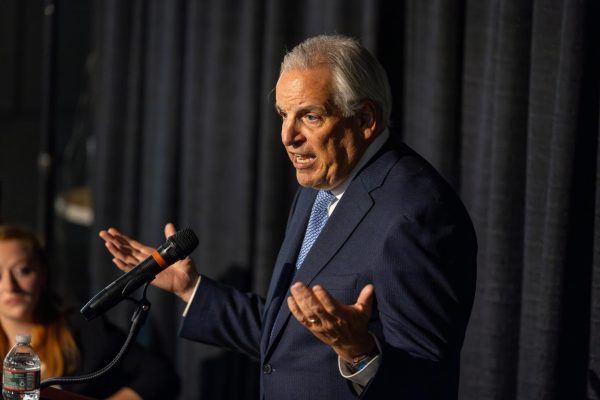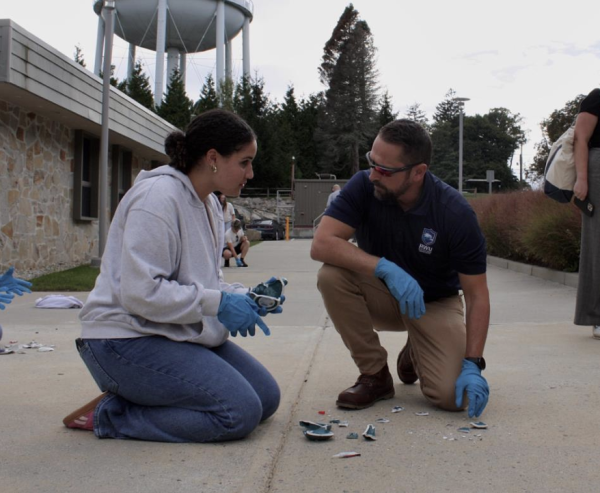College Democrats and Republicans host debate
On Wednesday Nov. 2, the Roger Williams University College Republicans and College Democrats held a debate in CAS 157 to discuss topics ranging from climate change, international relations, term limits and inflation. Those representing the College Democrats were Matthew Tilly, Brenna Krivoruk and Jessica Taddeo and those representing the College Republicans were Joseph Pistulli, Brian Carroll and Matteo Walrath. The debate was moderated by RWU Professor of Political Science and International Relations, Dr. Joseph Roberts.
The first topic was on the Inflation Reduction Act which was signed into law on Aug 16, 2022, with the goal of reducing the deficit, lowering prescription drug costs and investing in domestic energy production.
The Democrats took a stance in support of the act with the justification that the money being used for future investments such as shifting the United States’ reliance on energy from other countries to being fully domestic.
In response, the Republicans looked at the issue from a short-term lens stating that, in order to accommodate for the increased spending, more money will have to be printed thus leading to more inflation.
The next topic was on immigration and refuges. The Republicans took that position of supporting immigration in a way that, instead of focusing so much on whether or not to keep the country’s borders open or closed, the actual process of entering and obtaining citizenship should be examined and made easier.
The Democrats showed their support for the Dream Act and explained the necessity of having an outlined path to citizenship put in legislation. They also emphasized the moral responsibility to support undocumented immigrants since they provide part of the workforce in the United States.
The debate then shifted to discussing climate change and renewable technologies. The democrats talked about the importance of the US becoming a role model for the world in renewable technology and energy production and that setting the precedent for relying more on those technologies could have a large-scale effect on the rest of the world.
The Republicans took a position that the transition to renewable energy production should happen at a slower pace to allow time for more studies to be done to determine what are the most critical causes of climate change. They also explained that competition would be the best way to innovate in renewable technology contrasting the view of the Democrats who believe collaboration on an international level is the best way to transition away from fossil fuels.
One topic that both sides found common ground on was that of term limits for both Congress and the Supreme Court. Both agreed that when you have a large number of recurring incumbents every election, those positions become less representative of the electorate.
There was agreement with amending the constitution to include term limits to both Congress and the Supreme Court.
While on the topic of the Supreme court, both sides were asked whether or not it should be expanded to 13 seats to better reflect the number of circuit courts in the country. The Republicans responded by saying that, while more seats should be added, the process should not be up to the President. They described a system where a bipartisan committee decides on who should be appointed would be more beneficial.
The Democrats took the position that having an ultra-politicized and packed court is nota good thing and that it begs the question of whether or not a two-party system even works not just in the court, but in all aspects of politics as well.
The final topic was on the role of the media in American democracy and politics. The Republicans took the stance that political journalism should be about news and facts and that reporting based on opinions that we see in a lot of the more popular media outlets should not be a primary focus in the media.
The Democrats explained that it is near impossible to be unbiased in today’s media climate with just how much information is out there. They also explained that, because of how easy it is for anyone to be a “reporter” online and how easy it is to spread quick, easy-to-read headlines that may not be accurate, it is difficult for the voting population to truly determine what is real, what is fake and that they will more likely than not just listen to whatever sources already line up with their existing biases.

Sam Elwell is the Managing Editor for The Hawks' Herald who has also served as the Opinions Editor (2021-2022) as well as a staff writer (2020...





